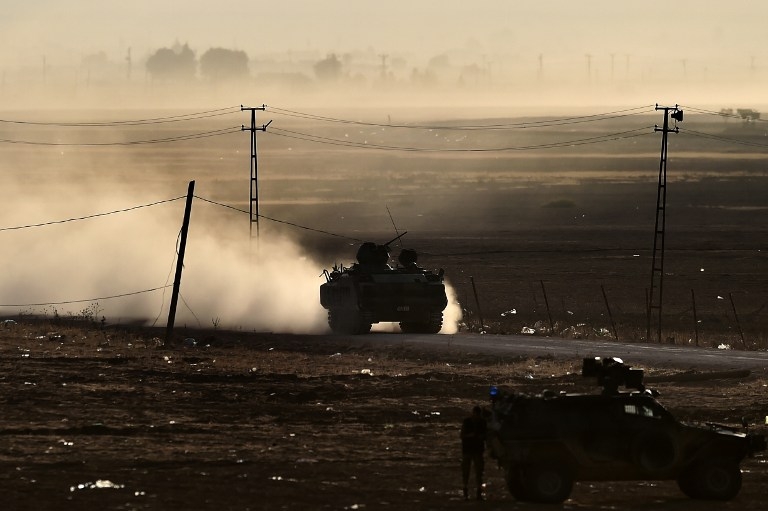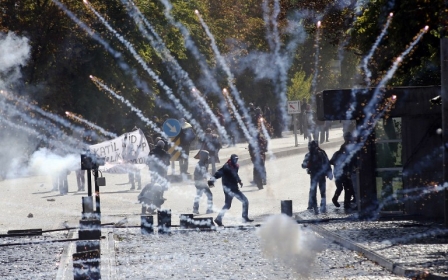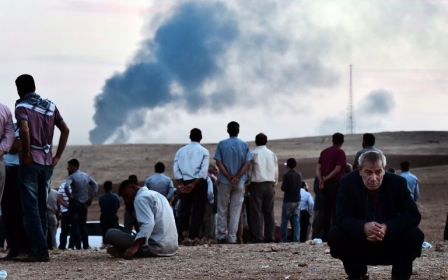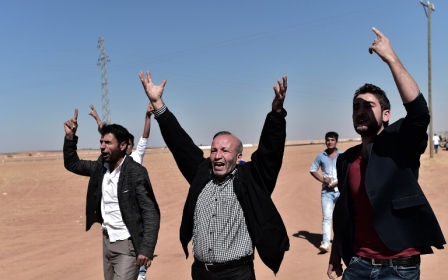UN envoy urges Turkey to allow Kurds across border into Kobane

Kurdish residents in Kobane "will be most likely massacred" by advancing Islamic State militants, a UN envoy warned Friday, urging Turkey to stop blocking Kurds from crossing into Syria to defend the besieged town.
The plea to Ankara by Staffan de Mistura, a Swedish-Italian diplomat appointed as UN envoy on Syria in July, was a highly unusual one. Normally, the United Nations strives to be neutral in conflicts.
But de Mistura said he was speaking out because the imminent danger confronting Kobane draws parallels to the 1995 Bosnian war massacre of 300 men and boys in Srebrenica when UN peacekeepers failed to intervene.
As heavy street clashes and air strikes continued on Friday, locals in Kobane told MEE that the Islamic State militant group battling the town for the past three weeks has made progress and the next few hours of fighting will be crucial.
After Kurdish forces repelled IS fighters back Thursday evening, IS returned Friday with more mercenaries and heavy weapons, Barzan Iso, a freelance journalist in the town told MEE midday on Friday.
“It’s not clear who’s winning. Without these air strikes, IS would occupy the city,” Iso said.
“[IS] have captured new streets and suburbs in Kobane. They are advancing towards the city center. The next few hours will be crucial,” Idris Nassan, senior spokesperson for the Kurdish fighters said by phone.
Reports say the IS militants have overrun the headquarters of the Kurdish forces in Kobane after a three-week offensive.
Showing a satellite image to reporters in Geneva, de Mistura said Kobane, which sits just a few kilometres (miles) from the Turkish border, was "literally surrounded" except for one narrow entry and exit point.
There were up to 700 mainly elderly civilians still inside the city centre and another 10,000-13,000 gathered nearby, all of whom were at risk, he said.
"If this falls the 700, plus perhaps if they move a little bit further, the 12,000 people ... will be most likely massacred," he warned.
"We would like to appeal to the Turkish authorities in order to allow the flow of volunteers at least, and their equipment to be able to enter the city to contribute to a self-defence operation," de Mistura said.
He said the volunteers should be allowed to go "with sufficient equipment to be able to fight and defend Kobane", but refused to say whether he thought Turkey should provide weapons.
Pressure on Turkey to fight
As the fighting raged on, the US continued to urge Turkey to join the fight against advancing Islamic State fighters undeterred by US-led air strikes.
In fighting that killed dozens, calls grew for ground action to support Kobane's beleaguered Kurdish defenders whose leadership see their resistance, alongside Free Syrian Army fighters, thus far as a victory.
After talks with NATO chief Jens Stoltenberg on Thursday, Turkish Foreign Minister Mevlut Cavusoglu said Ankara could not be expected to act alone.
"It's not realistic to expect that Turkey will lead a ground operation on its own," he said.
There has been disappointment in Washington and elsewhere that Ankara has yet to commit its well-equipped and well-trained forces to the fight against the militants, although some analysts like Thomas Pierret, lecturer in contemporary Islam and director of the University of Edinburgh's Centre for the Advanced Study of the Arab World, have noted the inconsistency of the US position on Syria.
In recent days, particularly as the US has sent Apache helicopters in Iraq, US commentators have raised the spectre, four weeks after the US-led air campaign against IS began in Syria, of mission creep.
"Just four weeks later, Obama is dropping more bombs on Syria than he ever did, in the course of a day, on Iraq. How did this happen? The way mission creep usually happens: It crept up on him," wrote Fred Kaplan, author of The Insurgents: David Petraeus and the Plot to Change the American Way of War, in Slate on Wednesday.
The death toll from ongoing pro-Kurdish protests in Turkey has risen to 31 after a man died after being injured in demonstrations in Turkey’s southeastern province of Diyarbakir on Friday. Another 360 people have been injured, Turkey's Interior Minister Efkan Ala told reporters.
"The people in Kobane are our brothers and sisters," one protester told MEE contributors in Istanbul this week. "There will be a massacre if Turkey doesn’t step in, it is their responsibility and we are demanding they take it."
Turkey has said it will participate in the anti-IS coalition, but it wants the campaign to widen its scope and take on Syrian President Bashar al-Assad and the creation of a buffer zone to protect Turkey's security and house more than 1.5 million Syrian refugees, conditions Washington has so far rejected.
Two top US envoys - Retired general John Allen and US pointman on Iraq, Brett McGurk - met Thursday in Ankara with Turkish leaders seeking to win their NATO ally's support. US officials also announced that a joint US-Turkish military team will meet next week in Ankara to discuss the fight against the Islamist militants.
"There is no question that Turkey is well-positioned to contribute," in areas including military cooperation, US State Department spokeswoman Jen Psaki said, while stressing "it's not a situation where we are making demands".
State terror or window of opportunity
De Mistura urged Turkey to take action, warning of an eminent threat "all of us, including Turkey" and pointed to a window of opportunity created by the rise of IS which could help Damascus and other opposition groups find some common ground, for instance on local ceasefires.
On the other hand however, Turkish President Recep Tayib Erdogan Friday accused Syrian President Bashar al-Assad of waging "state terror", equating the crimes of the Damascus regime with those of Islamic State.
Ankara is concerned that the focus of the US-led coalition on fighting IS militants will take attention away from Turkey's long-standing aim of toppling the Syrian leader.
In a speech to the thousands of supporters in the Black Sea city of Trabzon, Erdogan said the Assad regime and IS were both terror groups who should be dealt with accordingly.
"We have always displayed a principled stance towards all terrorist organisations. We are not discriminating against terror organisations, saying this one is good or this one is bad," he said in the televised speech.
Earlier, Prime Minister Ahmet Davutoglu said: "Turkey is against ISIS just the same way that it is against Assad."
"Assad and ISIS are both responsible for all these events and tragedies," he told reporters in Ankara.
New MEE newsletter: Jerusalem Dispatch
Sign up to get the latest insights and analysis on Israel-Palestine, alongside Turkey Unpacked and other MEE newsletters
Middle East Eye delivers independent and unrivalled coverage and analysis of the Middle East, North Africa and beyond. To learn more about republishing this content and the associated fees, please fill out this form. More about MEE can be found here.




